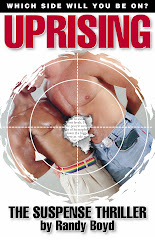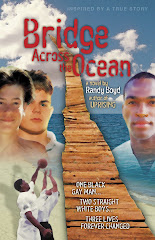 “Anybody have anything else?” asked the person in charge of the Monday morning staff meeting.
“Anybody have anything else?” asked the person in charge of the Monday morning staff meeting.“I do,” I said to my handful of co-workers around the conference table. I had been working with many of them for five years. Our job was writing and producing promotional material for one of the big Hollywood studios. It had been an uneventful meeting, but the department's only black employee was about to change all that. “I'm taking a leave of absence.”
The year was 1991. The life was being sucked out of me due to the AIDS virus. At the time, there was no medical hope and I was preparing for the beginning of the end, like so many others I had seen die of AIDS.
"No one dare eat a birthday cake on which a person with HIV/AIDS had blown out the candles."
“The reason is because I have HIV,” I told my co-workers. Stunned silence. White faces turning even whiter. Usually personal announcements were about weddings or newborn babies, but I was determined to go out on my own terms, not the subject of rumors and speculation, like so many others I had seen die of AIDS.
After the initial shock wave, I fielded questions about the virus within, patiently giving them a course in AIDS 101. After the meeting, it wasn't long before dozens others knew: Randy has HIV
 and is leaving at the end of the week. Secretaries, bosses, editors, production assistants, sound technicians, the voiceover guy.
and is leaving at the end of the week. Secretaries, bosses, editors, production assistants, sound technicians, the voiceover guy.During my weeklong farewell tour, I received tons of support in the form of pledges and promises, even offers for financial assistant. I'll call you for lunch sometime. We'll go to a movie. Let's not lose touch. I'll be there for you.
The week coincided with our monthly practice of “celebrating employees birthdays this month” with a cake at lunchtime. It was January, my lucky month. Midweek, we gathered in the conference room, unveiled a cake and sang Happy Birthday. When it was time to blow out the candles, I resisted. But there were only two birthday boys. I felt I had to go along with it.
After the candles were extinguished, the rest of my co-workers--more than a dozen people--stood against the wall, all refusing cake. There were excuses about diets and such, but the real reason was evident: no one dare eat a birthday cake on which a person with HIV/AIDS had blown out the candles."The longer I lived, the less interested those friends became in me and my journey."
Then Lisa, a well-liked female employee, entered the room. She was running late and had
 missed my “contamination” of the cake. Eagerly, she cut herself a slice. I watched the faces of my co-workers, all of whom seemed on the verge of blurting out: Don't touch that cake!
missed my “contamination” of the cake. Eagerly, she cut herself a slice. I watched the faces of my co-workers, all of whom seemed on the verge of blurting out: Don't touch that cake!On Friday, I was outta there, finally free of a stressful job that was killing me, quite literally. In the subsequent weeks, there were a few well-intended phone calls, even a lunch or two. But for the most part, my co-workers faded from my life and I from theirs. That is, until Magic Johnson made his famous HIV announcement later that November.
Those calls, however, were not about me. They were about a celebrity and his breaking news. “What do you think about Magic?” asked my former co-workers, as if I had some great nugget of wisdom to help them process their shock and disbelief.
In truth, all I had was my virus, my t-cell count, my fear and my journey, which, at the time, had little to do with a pro athlete and the compassion the world offered him. During those “Magic” phone calls, I received the same pledges of support my co-workers had given me some 10 months earlier. Promises left unfulfilled soon after Magic's journey faded from the front page.“What happened to all the love and support you had for me back then?”
Two years later, I had the opportunity to ask a former co-worker who had been a good friend of
 mine: “What happened to all the love and support you had for me back then?” His answer is what I remember most about that friend and our friendship:
mine: “What happened to all the love and support you had for me back then?” His answer is what I remember most about that friend and our friendship:“Out of sight, out of mind.”
It must be a sentiment shared by some of my friends. After leaving my job, it seemed only natural to tell them why. They, too, offered pledges of love and support. One even envisioned keeping a guest room in her home, just for me in my time of need, aka, my dying.
But the longer I lived, the less interested those friends became in me and my journey. By the late 1990s, it was beginning to look as if some people adopted me as friend because I had AIDS. As if I had become their personal feel-good project. They swore they'd be there for me when I was dying. Thing is, I've yet to play my part.
It's almost as if, because I didn't meet their expectations, because I'm still here, some friends no
 longer had any use for me. I couldn't play the role of the dying friend. I still have AIDS. I'm still gonna die someday. But when I didn't follow the script in the AIDS movie in their minds, I was let go, like an actor who is no longer needed on a soap opera.
longer had any use for me. I couldn't play the role of the dying friend. I still have AIDS. I'm still gonna die someday. But when I didn't follow the script in the AIDS movie in their minds, I was let go, like an actor who is no longer needed on a soap opera.It saddens me to think I wasted so much time worrying about the reactions of other people to my having HIV/AIDS. In reality, I didn't owe any of them any insight whatsoever into my personal medical information. You don't think about that when you're desperate and think you're dying. You just crave some small measure of comfort.
Now, my comfort comes knowing I'll never survived too long for me.













